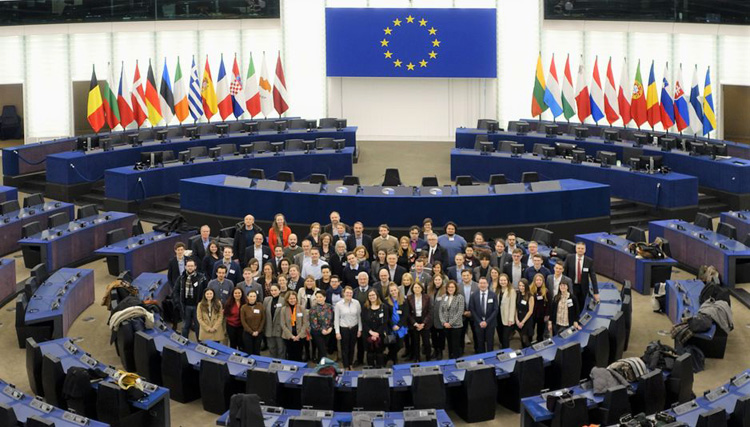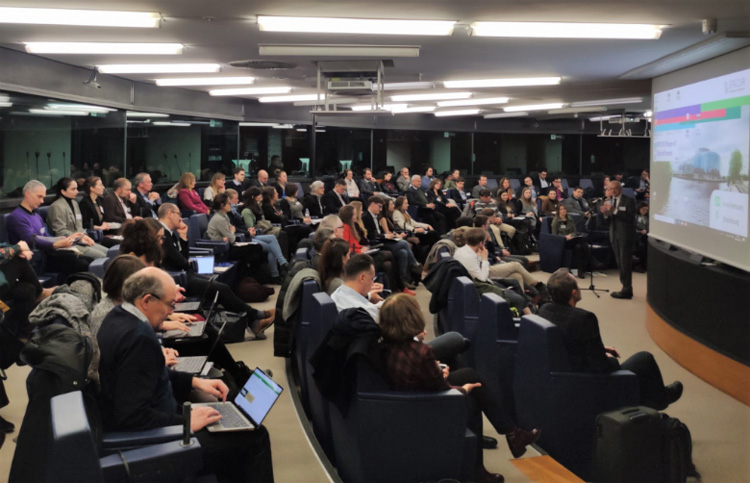Kick-off for the second funding phase of EPICUR in the European Parliament
Freiburg, Mar 07, 2023
The EU-funded project “EPICUR - European Partnership for an Innovative Campus Unifying Regions,” which includes a total of more than 300,000 students, nine partner universities, seven countries and a virtual campus, is setting a new course in teaching and research. Following the successful completion of the three-year pilot phase in 2022, the European University Alliance EPICUR was able to acquire 14.4 million euros for a period of four years via the Erasmus+ program. This will allow the project to continue under the name EPICUR Shaping Higher Education In Transition, or EPICUR SHAPE-IT for short. The University of Freiburg continues to focus on innovative teaching formats, cross-border learning and extended mobility opportunities for students, teachers and staff with a budget of around 2 million euros for this purpose.
 Kick-off for the second funding phase in the European Parliament: Following the successful pilot phase in 2022, the European University Alliance EPICUR was able to acquire 14.4 million euros for a period of four years. Photo: Schroder/UniStra
Kick-off for the second funding phase in the European Parliament: Following the successful pilot phase in 2022, the European University Alliance EPICUR was able to acquire 14.4 million euros for a period of four years. Photo: Schroder/UniStra
The official launch of the new phase of EPICUR Shaping Higher Education In Transition (EPICUR SHAPE-IT) took place in February during an event at the European Parliament in Strasbourg. This kick-off event brought together more than 100 people, including students, early-career researchers, faculty, and members of the associated partners and staff of the EPICUR teams from the nine member universities. The aim of the event was to jointly develop the action plan for the upcoming funding phase between 2022 and 2026.
More than a new framework for collaboration
“We need to raise awareness and promote the Alliance’s actions by making their impact visible in concrete numbers: their impact on student mobility, on the innovation they bring to initial education and lifelong learning opportunities of their members, as well as on the capacity of their researchers to take collective action to address the major challenges of our time. We must also engage our communities to assist in reaching these ambitious goals,” said Prof. Dr. Jean-Marc Planeix, strategic director of EPICUR, at the event’s opening.
In addition, the important role and the great ambitions of the Alliance were underscored by contributions from Anne Sander (member of the European Parliament), Christian Spahr (Secretary General of the Assembly of European Regions), and Areti Kourti (Chair of the EPICUR Student Board).
Prof. Dr. Michel Deneken, President at the University of Strasbourg and the Alliance, underlined the importance of European cooperation between universities for a peaceful, free and progressive society. He also stressed the event’s essence: “The importance of science in the service of open and critical thinking and the academic principles of respect and objectivity.”
 More than 100 people from the nine member universities develop the action plan for the upcom-ing funding phase between 2022 and 2026. Photo: Schroder/UniStra
More than 100 people from the nine member universities develop the action plan for the upcom-ing funding phase between 2022 and 2026. Photo: Schroder/UniStra
Visions for a reformed and sustainable education
In a panel discussion moderated by journalist Dorothée Haffner, Prof. Dr. Planeix and Alison Garnier-Rivers, coordinator of the Higher Education Alliance, recalled the objectives and possibilities for action to be developed in the seven working groups (workpackages). Juan Rayón González, President of the Erasmus Student Network (ESN), also participated in the debate. On behalf of the University of Freiburg, Prof. Dr. Daniela Kleinschmit was represented as a member of the EPICUR Management Board.
“When designing education for students and academics in general, it can be challenging to envision future possibilities. But by improving communication and interaction among us, we can make our vision a new reality,” Kourti said after the discussions’ conclusion. “In this sense, EPICUR will help change the way we approach education and open up a variety of opportunities for students in a different context than we are used to. Overall, EPICUR will be an established and widely recognized way by which our unity in diversity can thrive and education can be redefined.”
Strategic discussions, workshops and debates: fruitful exchanges in Strasbourg
The following two days were dedicated to the strategic direction, next concrete steps, new challenges and the distribution of tasks between EPICUR teams and associated partners.
“We were all very happy about the joy, commitment, motivation and quality of exchanges within the different working groups,” explains Planeix. For the official launch of EPICUR SHAPE-IT, he calls on all university communities to share ideas and enthusiasm to move forward and create a new academic space that animates universities, faculties, departments and services. “EPICUR brings people together across geographic and political boundaries, disciplines and status. It is a philosophical vision for the academic world of tomorrow.”
Contact:
Katharina Kiefel
Office of University and Science Communications
Division of Science Communication and Strategy
EPICUR Communications Officer
Tel.: 0761/203-95426
email: katharina.kiefel@zv.uni-freiburg.de

